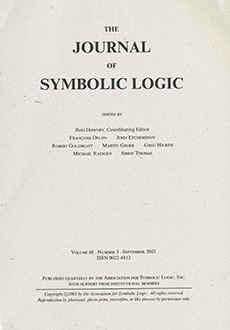Abstract
The Dedekind cuts in an ordered set form a set in the sense of constructive Zermelo—Fraenkel set theory. We deduce this statement from the principle of refinement, which we distill before from the axiom of fullness. Together with exponentiation, refinement is equivalent to fullness. None of the defining properties of an ordering is needed, and only refinement for two—element coverings is used.
In particular, the Dedekind reals form a set; whence we have also refined an earlier result by Aczel and Rathjen, who invoked the full form of fullness. To further generalise this, we look at Richman's method to complete an arbitrary metric space without sequences, which he designed to avoid countable choice. The completion of a separable metric space turns out to be a set even if the original space is a proper class; in particular, every complete separable metric space automatically is a set.
Citation
Laura Crosilla. Hajime Ishihara. Peter Schuster. "On constructing completions." J. Symbolic Logic 70 (3) 969 - 978, September 2005. https://doi.org/10.2178/jsl/1122038923
Information





